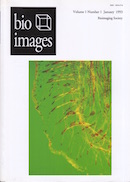The disorganization of actin polymerization associated with lamelipodia formation in neutrophils of patient with leukocyte adhesion dysfunction syndrome (LAD), which lack Mac-1 on their membranes due to point mutation, was analyzed with a bioimaging system using a polarized microscopic system LC-Pol Scope. Neutrophils of the patient showed depression in spreading, random migration, and chemotaxis to fMet-Leu-Phe (FMLP) and IL-8, and expression of integrin adhesion molecules CD11a, CD11c, and CD18 on cell surfaces of peripheral leukocytes. However, CD11b expression on the surface, the expression of CD18 mRNA, and adherence to a cover glass were close to the normal levels or slightly decreased. In addition, O
-2 production, myeloperoxidase release, and sensitivity to FMLP of neutrophils of the patient were also within normal levels. The disorganization of the fibrous cytoskeleton was observed with a scanning electronic microscope after Triton X-100 treatment followed by actin polymerization with rhodamin-phalloidin staining. Moreover, the disorganization of actin polymerization of neutrophils stimulated with FMLP on non-specific adherence of neutrophils to the cover glass was analyzed with a newly developed bioimaging technique using a polarized light microscope LC-Pol Scope for a kinetic analysis of polarized material in living cell under real-time observation. In addition, films processed under the LC-Pol Scope system showed that neutrophil cells of the patient still were round-shaped with disorganization of actin polymerization different from that in control cells.
View full abstract
